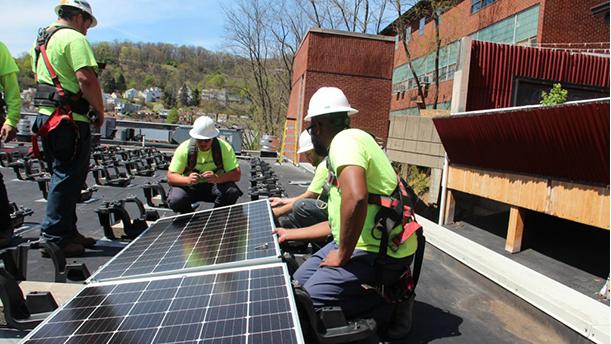Solar jobs now outnumber coal jobs in the US
Workers for Energy Independent Solutions install solar panels at a Millvale, Pennsylvania, community center.
While coal still produces much more energy in the US than solar, solar jobs now outnumber those in coal by more than 2-to-1, according to the Department of Energy.
This movement away from coal and towards renewable energy is inevitable and will continue to accelerate, energy and economics experts say. While in the long run, this will likely be good for both the environment and the overall economy, in the short term, the economic prospects for individual workers can be discouraging. Moving to jobs in the solar industry typically involves a pay cut.
“If you had to take another job, in this area especially, you’re going to take anywhere from a 50 to 70 percent pay cut to what the next best thing that’s out there,” says Craig Williams, who works as a foreman at Consol Energy’s Harvey mine, about an hour south of Pittsburgh.
“Pittsburgh used to be big on steel. That’s mostly gone now,” Williams says. “We’re one of the last industries around, and we hope to keep it that way.”
That may not be possible: 40 percent of coal-mining jobs have disappeared since 2011, and now only 50,000 of these jobs remain. Experts say automation, lower demand for electricity, and, above all, competition from cheaper fuels are killing the industry. Those fuels include natural gas from fracking, and, increasingly, renewable energy.
Rob Godby, an energy economist at the University of Wyoming, says one of the biggest challenges facing workers in the coal industry is simple: location. “When you are thinking about coal mining in Appalachia, oftentimes there are generations of families in those regions, and it's just very difficult to pick up and move,” Godby says.
Nationwide, coal miners make on average of $35 an hour, Godby says, in part because the job can be so dangerous. In renewables, the pay averages between $20 and $25 an hour. “That doesn't mean you couldn't raise a family on that, but you're a lot closer to the average income in a lot of states in the solar industry than you are in mining industries,” Godby says.
For some workers, however, the switch to a job in the renewable energy industry has proved successful. Wylie Koontz, 23, used to work at a coal mine, though as a lower-paid contractor. When he got laid off last year, he saw a job opening with Energy Independent Solutions, a local solar company.
“I didn’t like, just mentally, to completely switch,” Koontz says. “It was a coincidence I found this job and it was about the same pay rate that I was making before, so I just went for it. I ended up really liking it.”
A steady paycheck, not necessarily the environment, is what attracted him to the job. Koontz says he likes the problem-solving he gets to do in solar, and he could see himself staying in the industry. One thing that did not weigh on his decision: climate change.
“I don’t really believe in the whole climate change thing or not,” Koontz says. “I mean, it’s good, it takes the carbon [out of the air] for sure. … It’s a lot cleaner energy.”
Brian Krenzelak, a former roofer who joined Energy Independent Solutions 7.5 years ago, does believe in the mission of green energy. He installs solar panels and trains others to do the job. His wife also works, and the couple has three kids, one in college, with another about to enter. They even have a second home in Florida.
“I do well with this company. Very well,” Krenzelak says. “It covers what we need to cover. I'm not becoming a millionaire overnight, but steadily I have been building the nest egg, for sure.”
Experts say solar’s boom is being helped by incentives that are scheduled to run out in a few years, and they don’t know how long the surge in business will last. Some companies are reporting lower installations nationwide. But solar jobs in Pennsylvania grew last year by almost a quarter. Energy Independent Solutions is busy. It’s looking to double its workforce of 22 over the next year and a half.
“We had to slow the salesmen down at a certain point, we were selling so much solar,” Krenzelak says. “We had to actually slow them down a little bit until we caught up.”
Krenzelak likes the idea that his industry is up-and-coming. He says when his crew went on a big installation recently, other contractors were curious about what they do. “So, there were iron workers there, carpenters, union laborers. Everyone’s coming up to us,” he says.
For Krenzelak, solar feels like the industry of the future. And when he looks into the future, he likes what he sees.
This article is based on an interview from Allegheny Front that aired on PRI’s Living on Earth with Steve Curwood.
